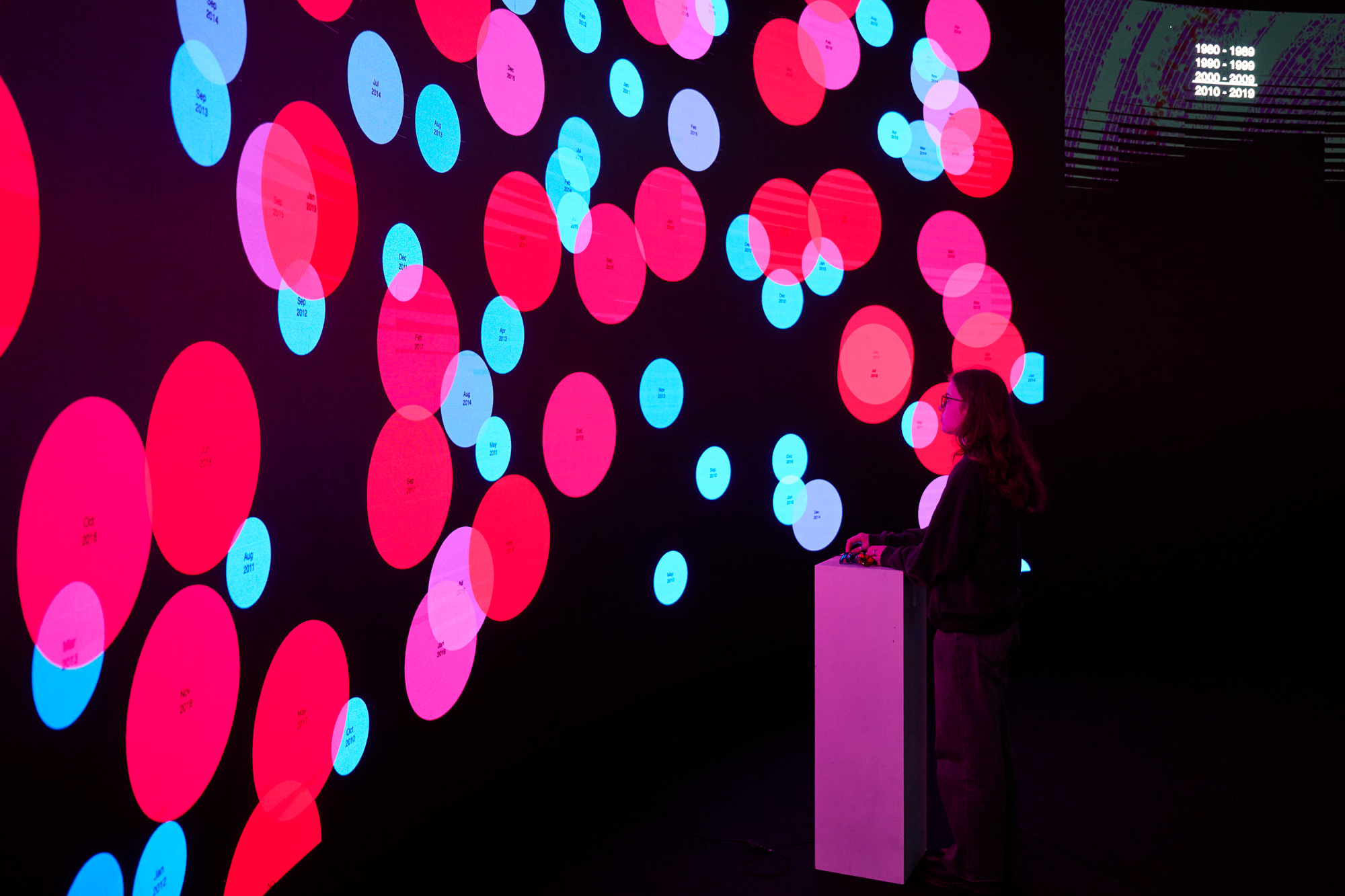
Data Science and AI in Creative Industries MSc
Learn how computer science, data analytics, and AI drive innovation and enhance everyday experiences in the creative industries.
-
Course Duration
Full-time 1 year
-
Annual Fees
- Home (full-time) £11,000
- Overseas (full-time) £24,000
-
Course Start
September 2026
- How to Apply Request a prospectus (opens in a new window)
The MSc in Data Science and AI in Creative Industries builds on your experience in creative and non-technical subjects to prepare you for professional roles in the rapidly evolving fields of creative technology, data science and AI.
This course takes an experimental and exploratory approach, enabling you to investigate fundamental conceptual and technological frameworks. You will engage with a range of computational approaches to data science questions, using your specialist knowledge to interrogate and redefine the boundaries of data science and AI, presenting innovative solutions based on experimental research data and methods.
This course is for those looking to break into data science and AI from non-technical backgrounds. The course focuses on tackling complex data science problems within creative technology and functional AI. Through project-based learning, you will enhance your skills in modern programming languages, machine learning methods, experimental tools, and data analysis.
The course supports a critical and ethical approach, reflecting on the social implications of data science and AI on society. There is an emphasis on interdisciplinary collaboration and creative problem-solving to strengthen your technical and teamwork skills, critical thinking, and your proficiency in analysing, validating, and interpreting data.
Why study with us
-
Advanced technical skills
Develop your expertise in modern programming languages, machine learning methods, experimental tools, and data analysis, creating sophisticated, clean, and efficient solutions.
-
Interdisciplinary approach
Benefit from shared delivery with other postgraduate courses, fostering a collaborative environment that reflects industry practices and promotes knowledge-sharing and interdisciplinary interaction.
-
Professional-level resources
Utilise a wide range of professional resources, including contemporary technology and industry-standard tools, media labs, 2D & 3D studios, workshops, computer labs, high-specification PCs, digital darkrooms, analogue and digital resources, licensed specialist software, a media resource centre, and the Make Space, supporting you in creating practical and creative solutions to project briefs.
-
Ethical and inclusive research
Adopt an ethical approach to your work, focusing on the social and ethical implications of data science and AI, and emphasising accessibility, equality, diversity, and sustainability.
-
Professional portfolio development
By the end of the course, you will have created a professional body of work that reflects your interests and prepares you for industry, enhancing your ability to communicate research visually.
-
Innovative problem solving
Engage with complex computational problems through project-based learning, promoting original and innovative approaches to technical proficiency and professional working methods.
Course Details
This course is part of our suite of Master’s in Computing, Games and Data Science, offering a collaborative framework across various specialisations, including MSc Creative Computing, MSc Games Computing, and MSc Data Science and AI in Creative Industries. This provides students with opportunities to engage with peers from different disciplines while working on individual assignments. Such collaboration mirrors the professional dynamics in the creative industries today, allowing students to gain valuable experience in interdisciplinary teamwork and real-world problem-solving.
This programme is a one-year course, including 30 weeks of direct teaching time and a 15-week final project. You will need to complete five units and one 60-credit major project (180 credits in total). All units on the course are compulsory and must be passed in order to complete the award. If you study part-time your modules will be split across two years. Full course details, including aims and assessment criteria, will be provided in the course specification upon validation.
Core practice and context in Data Science and AI in Creative Industries (60 credits)
This unit launches your master’s study experience at Norwich, immersing you in cutting-edge practices and emerging research in data science and AI, with a particular focus on the creative industries. You will develop critical comprehension and knowledge in creative technology and machine learning, emphasising data science practices and functional AI approaches. This unit encourages an expanded approach to creative thinking, examining broader systems and the interconnected boundaries of data science and AI with other fields. Students will explore research methodologies, allowing for articulate critique and analysis, applying scientific principles to create mathematical models of real-world problems using practical coding skills. Through research-led projects, continuous experimentation, and reflection, you will deepen your understanding of these technologies. This process will help you grasp broader concepts and ethical implications, preparing you for a successful career in the digital technology sector or creative industries.
Advanced technical skills in Data Science and AI in Creative Industries (20 credits)
This unit equips students with advanced technical skills essential for computational practices in data science and AI. Through a combination of individual and group projects, students engage with various media and processes, refining their technical expertise to tackle theoretical and conceptual challenges. The unit will cover algorithmic design, machine learning, data analysis, interactive dashboards, neural networks, predictive modelling, and emerging technologies like AR/VR/AI. The unit’s research-led framework, combined with iterative experimentation, will deepen your practical expertise and expand your working methods with innovative ideas, equipping you to shape and influence the evolving landscape of data science and AI.
Dialogue, debate, and domain knowledge in Data Science and AI in Creative Industries (10 credits)
This unit explores leading practices and emerging data science and AI research within broader socio-economic, political, ethical, and cultural contexts. Through reflective analysis and interactive sessions, you will deepen your understanding of key themes such as machine learning theory, creative computing theory, and globalisation. The course focuses on computing ethics, social data science, and international data policy, preparing you to analyse and apply critical approaches to technology development in your work. The unit includes research-led projects, critical reflective writing, and an examination of computational design practices, positioning you as a critically engaged practitioner ready to contribute to contemporary and cultural debates.
Professional technical skills in Data Science and AI in Creative Industries (20 credits)
This unit builds on the ‘advanced technical skills’ unit, enhancing your professional-level expertise in data science and AI. It emphasises the importance of technical proficiency in supporting the theoretical and conceptual aspects of computational design and prototyping. Through practice-based research projects and both individual and group work, you will refine computing processes, explore innovative solutions, and push the boundaries of digital environments. The curriculum covers algorithmic design, machine learning, data analysis, interactive dashboards, and emerging technologies like AR/VR/AI. You will challenge established technical norms and fully utilise contemporary and emerging techniques, seamlessly blending theoretical concepts with technical expertise to produce complex and innovative outcomes.
Advanced critical context in Data Science and AI in Creative Industries (10 credits)
This unit enhances your knowledge of data science and AI, focusing on developing effective research and reflective strategies. It will deepen your critical understanding and expertise, broadening your contextual knowledge of socio-economic, political, ethical, and cultural issues. Building on the content covered in the ‘dialogue, debate, and domain knowledge’ unit, you will engage in interactive sessions to interrogate critical frameworks such as machine learning theory and globalisation. The unit involves refining research approaches, examining the boundaries of communication disciplines, and contributing to broader knowledge debates. Hand-on projects and iterative analysis cycles will strengthen your ability to synthesise conceptual and practical problem-solving, positioning you as critically engaged reflective practitioners who use a range of research methods to expand social and ethical dialogues.
Major project (60 credits)
The major project unit is the culmination of the MSc in Data Science and AI in Creative Industries, applying accumulated knowledge and skills to a project. You will identify a research question, design a project to test hypotheses, and achieve innovative outcomes, which may include multiple outputs or a focused study on a specific aspect of your practice. Supported by academic staff with professional experience in data science and AI, you will deepen your knowledge and understanding of the historical, theoretical, cultural, technical and economic contexts that surround your chosen topic. Indicative fields of study may include or focus on machine learning, networks, modelling, computational visualisation, and the Internet of Things. Research-led practice will help you to engage with established, contemporary, and future-facing techniques and technologies supporting the ideation and realisation of your major project. This will further your personal knowledge and confidence in synthesising experiments and ideas into complex creative outcomes.
Download course specifications
Learning and teaching
The course is delivered through a variety of engaging learning and teaching methods.
-
Lectures
-
Seminars
-
Tutorials
-
Technical labs
-
Independent and group work
Assessment
Our assessment methods will vary based on the unit you choose and provide a comprehensive measure of your learning and progress. These methods may include:
- Critically reflective essay
- Course work
- Presentations
- Learning journal
- Reflective evaluation
- Body of creative work
- Reflective research report
- Team project evaluation
- Major project
- Supporting documentation
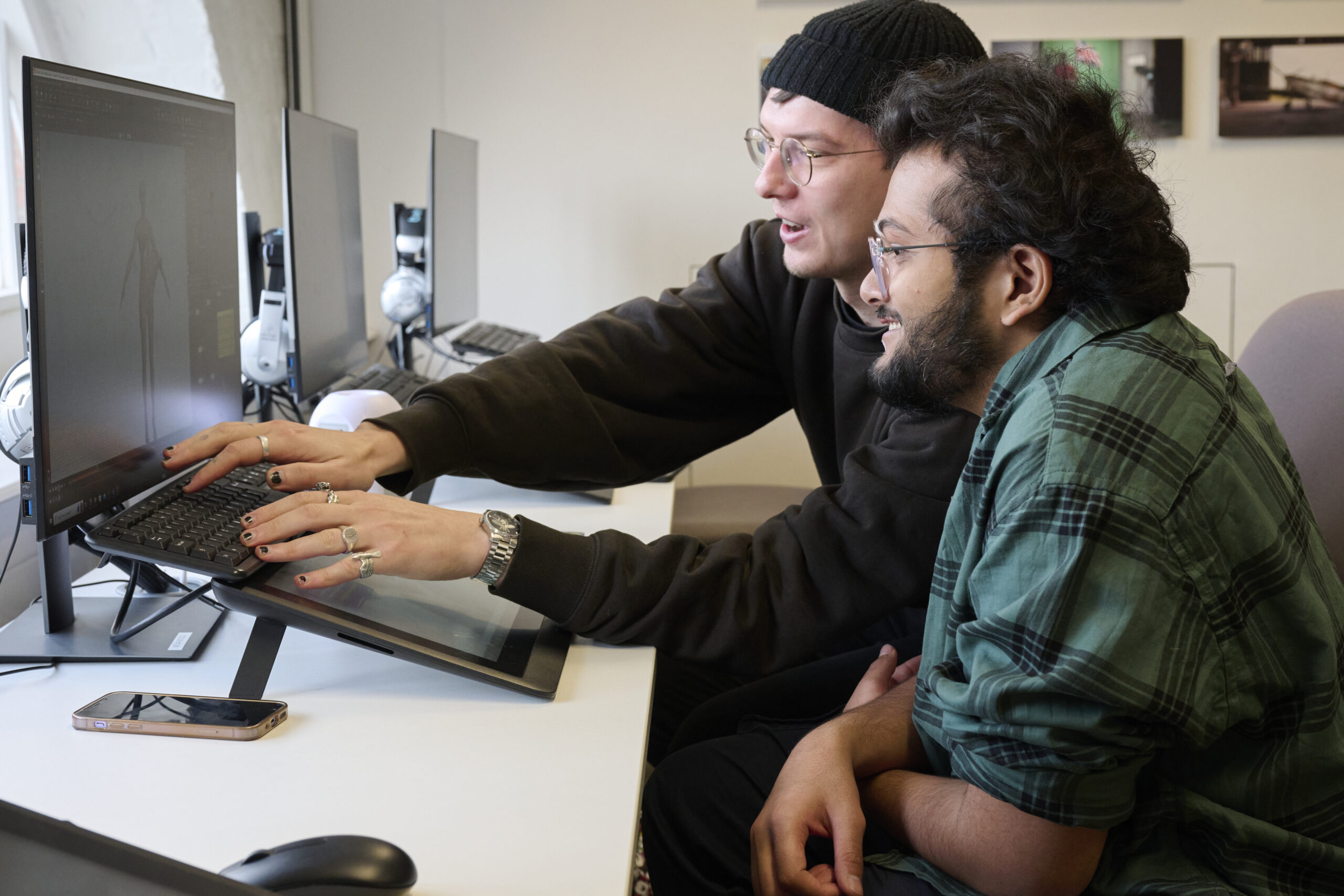
Typical career paths
The use of data science and AI in the creative industries is only just starting, and the opportunities around this field are growing as people change how they do business. Our MSc in Data Science and AI equips you with skills and knowledge for a dynamic career across a range of creative industries, combining interdisciplinary opportunities with your unique expertise. By combining data science and AI knowledge with creative practice, you’ll graduate ready to apply advanced techniques to real-world challenges. You’ll be prepared for roles across various industries, with the ability to critically evaluate methodologies, design and conduct empirical research and effectively communicate your findings.
This course prepares you for a career in a variety of disciplines related to games computing, including:
- Data analyst
- Data architect
- Data scientist
- AI creative technologist
- Digital media analyst
- AI-driven content creator
- Interactive experience designer
- Data-driven marketing strategist
- Media and entertainment data analyst
- AI-powered product designer
- Data visualisation specialist
The UK’s creative sector is thriving, contributing £111.7 billion annually to the economy and offering over 2 million jobs.
Department for Digital Culture Media and Sport (DCMS)
Entry Requirements
We typically require an honours degree of 2:1 or above. Applicants should have a good working knowledge of programming gained from work, university study, or personal interest. Details on your programming experience should be included as part of your application.
Those with industry experience or relevant skills from non-traditional backgrounds are encouraged to apply, including individuals currently employed. If you’re unsure about your eligibility, please contact us for guidance before applying.
English language requirements (International/EU)
If English is not your first language, IELTS 6.5 (or equivalent) is required, with a minimum of 5.5 in reading, writing, listening, and speaking. We also accept other English language qualifications.
International Qualifications
We accept a wide range of qualifications from all over the world.
For information on entry requirements from your country, see our international pages.
Fees and funding
Home
Tuition fees for the 2026/27 academic year
- Full time: £11,000
The level of fee that you will be asked to pay depends on whether you’re classed as a UK
(home) or international student. Check your fee status.
Fees for subsequent years
The rules for inflation on fees in subsequent years depend on the type of fee status and level
For Home and overseas postgraduate degree students starting in 2026, fees will remain the same for each year of your course.
Funding your study
Depending on your circumstances, you may qualify for a bursary, scholarship or loan to help fund your study and enhance your learning experience. Find out more about scholarships and funding.
International
Tuition fees for the 2026/27 academic year
- Full time: £24,000
The level of fee that you will be asked to pay depends on whether you’re classed as a UK
(home) or international student. Check your fee status.
Fees for subsequent years
The rules for inflation on fees in subsequent years depend on the type of fee status and level
For home and overseas postgraduate degree students starting in 2026, fees will remain the same for each year of your course.
Funding your study
We offer a range of scholarships and bursaries for international students. To find out more and see if you’re eligible, please visit the scholarships for international students page.
Additional costs
Your course fees cover the cost of studies, and include loads of benefits, such as the use of our library, support from our expert employability team, access to workshops and free use of the IT equipment across our campuses. There are also other costs which you may need to consider.
How to apply
Home
Applications to our postgraduate courses should be made directly to Norwich University of the Arts using a Postgraduate Application Form.
Applications should be returned to admissions@norwichuni.ac.uk
Please see our Terms and Conditions and Admissions Policies for further details.
International
Postgraduate applicants can only apply directly by completing the below online application form or emailing the downloadable form to ioadmissions@norwichuni.ac.uk
International students requiring a visa should apply as soon as possible in the year they wish to start. Email our International Team for more information. Please see our Terms and Conditions and Admissions Policies for further details
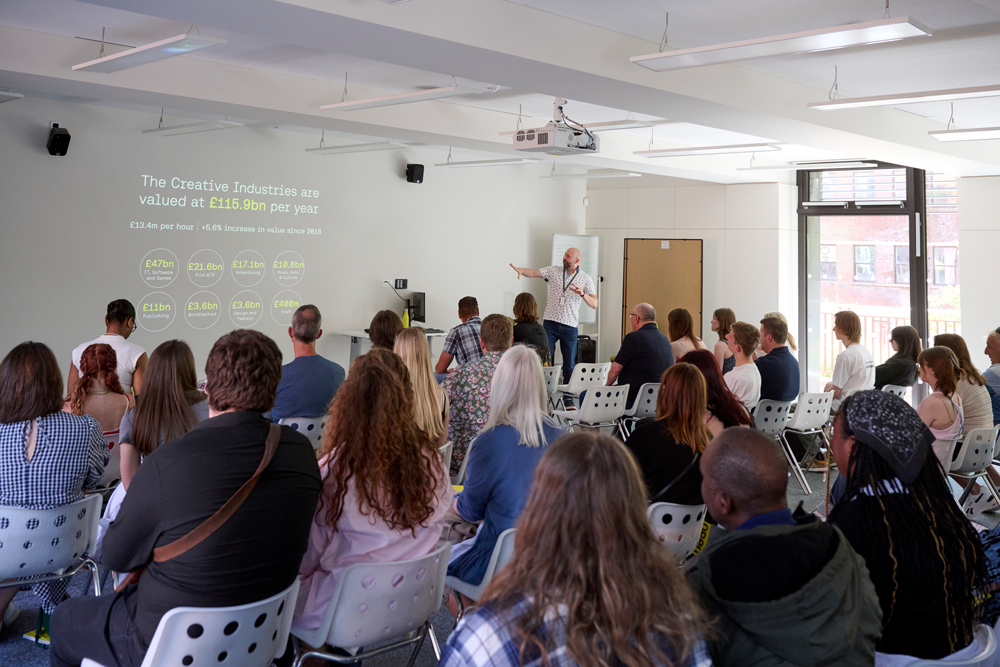
Latest news
-
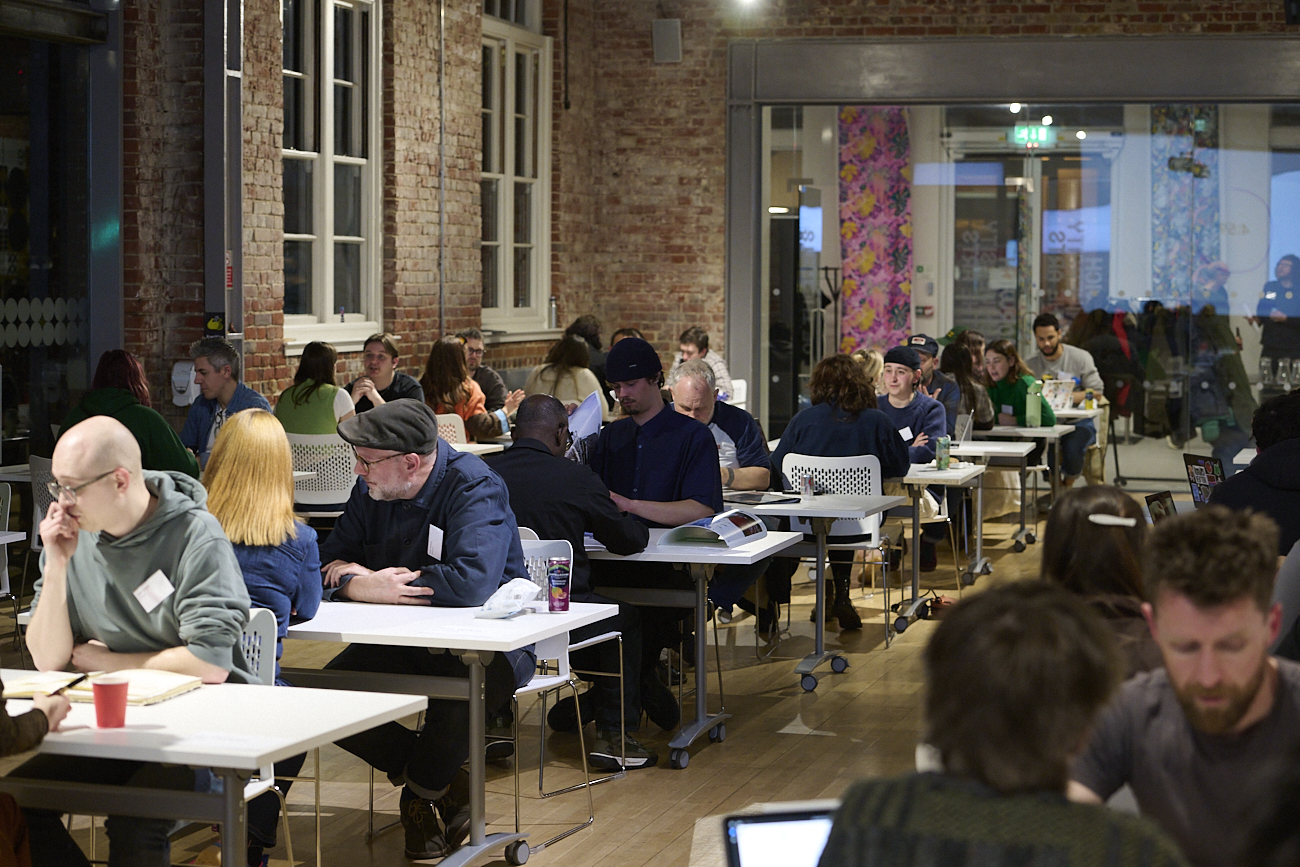 Employability •
Employability •Norwich University of the Arts celebrates 10 years of the Big Book Crit
Hundreds of Norwich students have shared their work with leading creative professionals over the last decade. -
 BA Business Management •
BA Business Management •Dean of Creative Education Awarded Prestigious Principal Fellowship from Advance HE
The University is delighted to announce that Hilary Carlisle, Dean of Creative Education and Professor of Design, has been awarded Principal Fellowship of the Higher Education Academy (PFHEA) by Advance HE -
 BA Business Management •
BA Business Management •In conversation with Norwich’s newest lecturers in Marketing and Business Management
We joined Norwich's newest lecturers, Stephen Balmer-Walters and Laurie McAllister, to find out more about the University's Marketing and Business Management courses. -
 BA Games Art and Design •
BA Games Art and Design •East of England set to become UK’s next Games Cluster, says landmark report
A major new report is calling for the creation of a Games Cluster for the East of England — positioning the region as a national leader in creative technology and immersive media. -
 BA Animation •
BA Animation •Cutting edge Sony Virtual Production Studio puts Norwich on the map for the future of film and gaming
Norwich University of the Arts and Sony open new landmark facility for students, creators and the community. -
 BSc Degree •
BSc Degree •Norwich University welcomes new academics to its Psychology and Computer Science courses
Lyndsey Wallace joins the University as Senior Lecturer for BSc (Hons) Psychology, with Jawwad Chattha joining as Course Leader for BSc (Hons) Computer Science. -
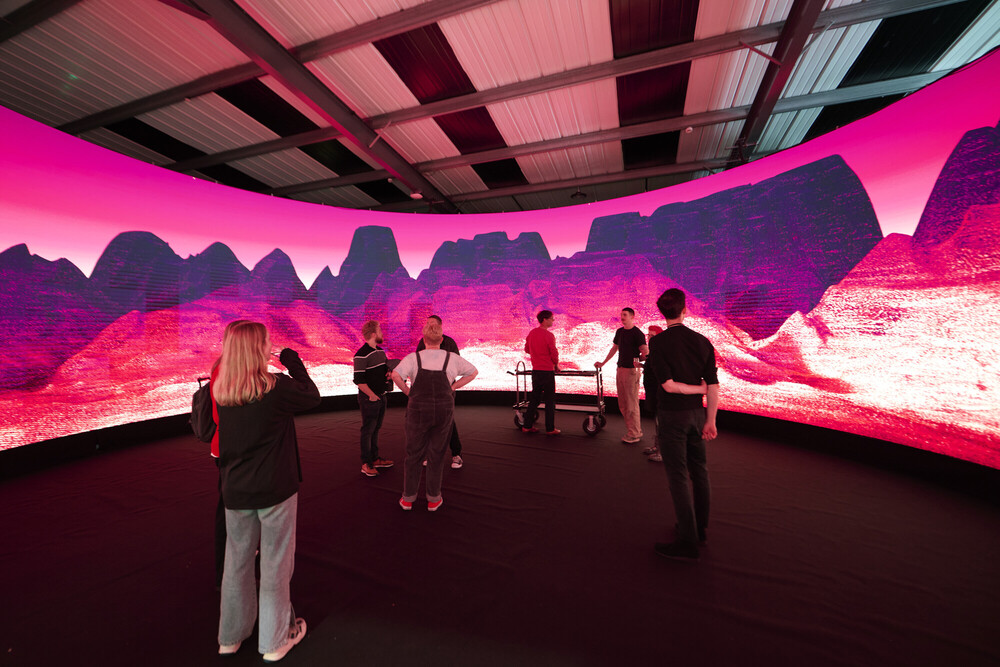 Institution •
Institution •Norwich University of the Arts Makes Historic Debut in Main Guardian University Guide
Norwich University of the Arts has marked a historic milestone, with its first-ever appearance in the Guardian University Guide’s national rankings. -
 Institution •
Institution •Norwich University of the Arts acquires Mechanism by artist Andrew Kearney
The kinetic installation, which transforms the sounds of Norwich into a daily light sequence, was commissioned in 2024 as a temporary intervention for the University’s historic Bank Plain building. -
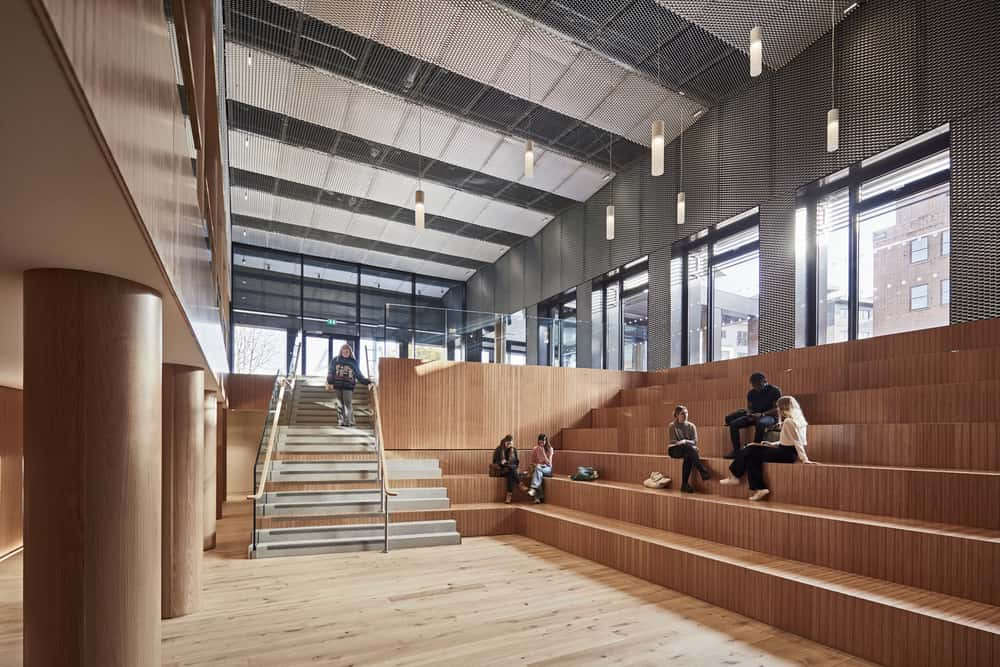 Cost of living support •
Cost of living support •Cost of living Support Package 2025-26
We are proud of the measures we introduced over the last few years and want to continue many of them in 2025/26 to ensure this support remains in place. -
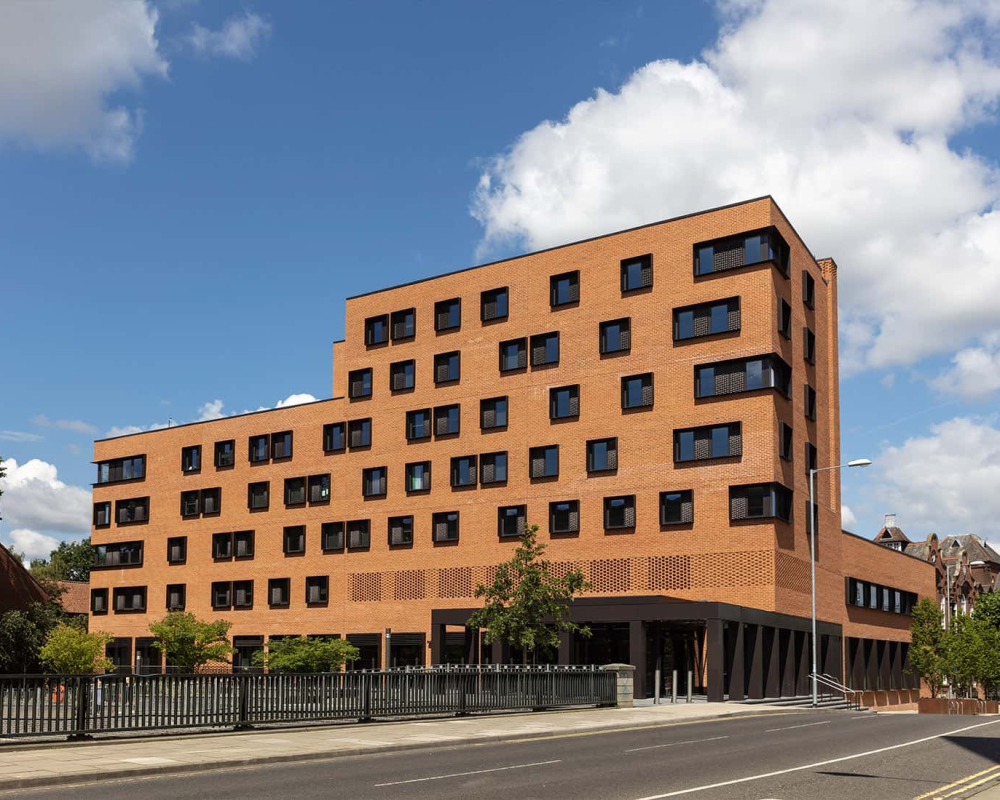 BA Degree •
BA Degree •Norwich University of the Arts moves up 25 places in The Complete University Guide
Norwich University of the Arts has been ranked among the UK's top two specialist creative arts universities — and the highest outside London — in the 2026 edition of The Complete University Guide
Related courses
Discover our courses and take the first step towards unleashing your potential
-
Visit the Creative Computing MSc course page
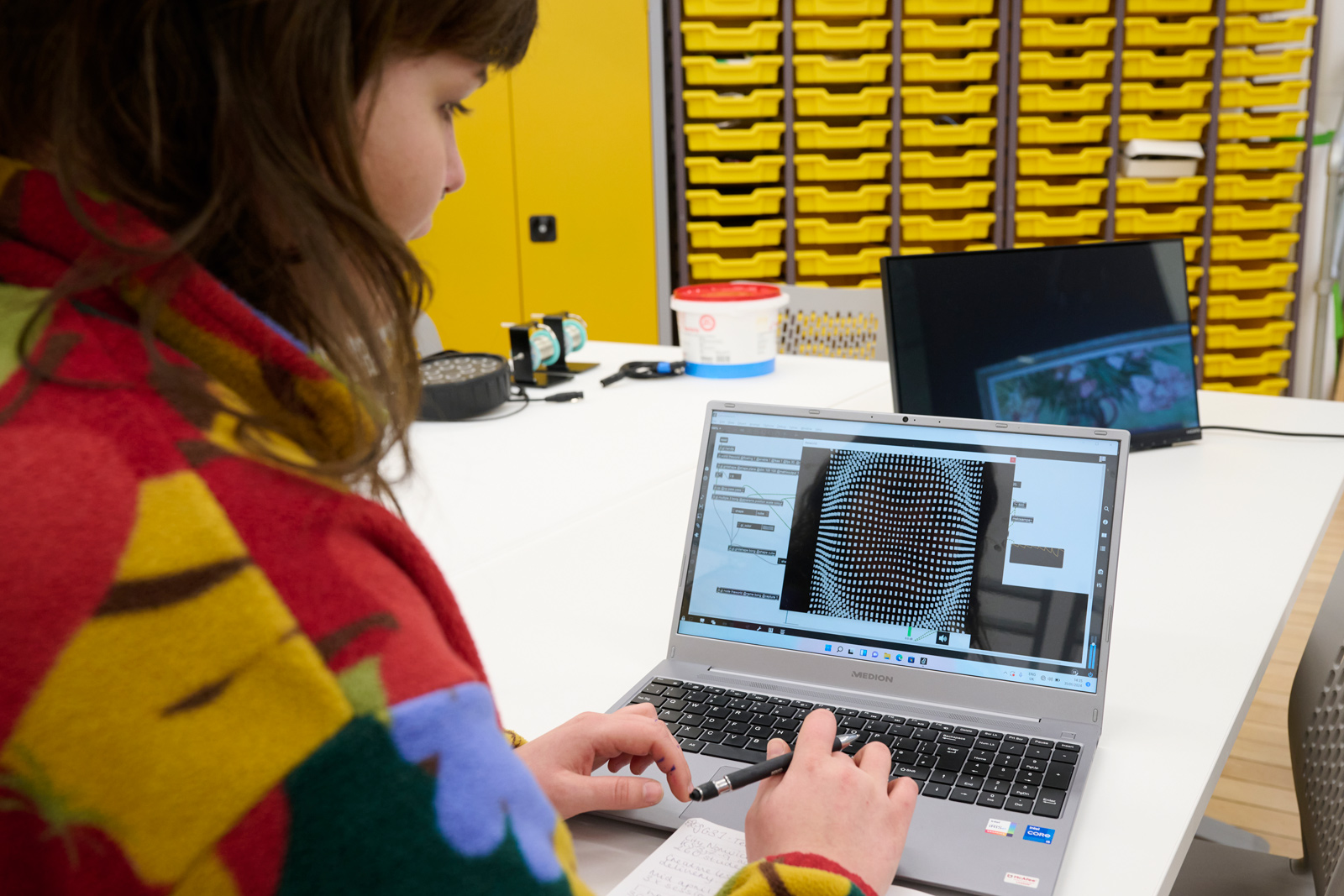
- Filter courses by study level: Postgraduate
- Filter courses by duration: Full time
- Filter courses by start month: September
- Filter courses by subject: Creative Computing
Creative Computing MSc
Discover how to use advanced programming and creative practice to design interactive experiences that push the boundaries of digital creativity.
-
Visit the Games Computing MSc course page
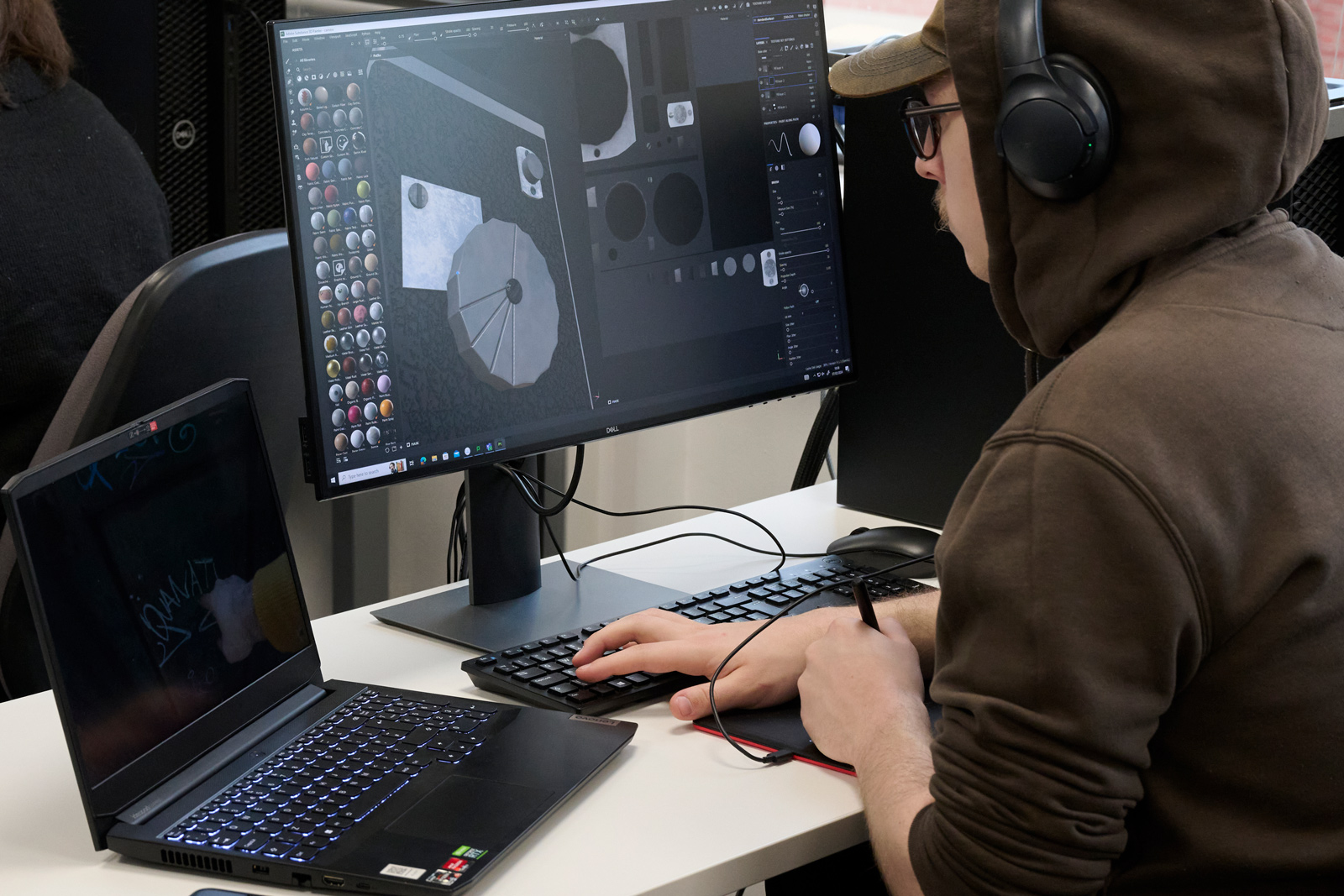
- Filter courses by study level: Postgraduate
- Filter courses by duration: Full time
- Filter courses by start month: September
- Filter courses by subject: Games Computing
Games Computing MSc
Gain the skills to develop software, systems, and content for modern video games, preparing you for a career in the computer games industry.